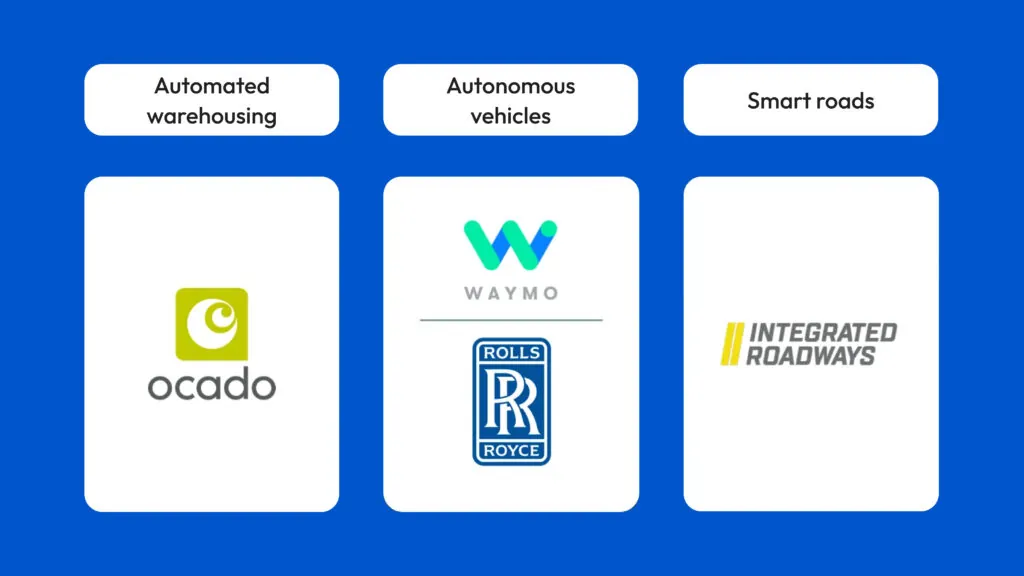How AI Solves the Top 5 Logistics Problems
AI is revolutionizing logistics and supply chain management in a way that is beyond dispute. Its application cuts across various fields: from predictive modeling to self-driving vehicles. In this piece, we focus on five promising applications of AI that have already started reshaping the logistics industry and companies that implement this emerging technology.
Applications of AI in Logistics
According to McKinsey, the value of implementing AI into supply chain and manufacturing could possibly be $1.3tn to $2tn annually. AI technologies are improving transportation and logistics by integrating processes and making the time required to complete such operations more efficient. Therefore, everyone would not be surprised to learn that companies in the IT industry, such as Google, Amazon, and Intel, are funding AI heavily.
Let’s explore five ways AI is reshaping logistics: automated warehousing, self-driving vehicles, integrated structure, artificial intelligence-enabled back-end operations, and uses of predictive analytics to improve clients’ experience. Now, let us discuss each of these innovations and look at their outlooks and examples.
#1. Automated Warehousing
AI promotes the efficiency and profitability of warehouse management through a complete transformation of operations. One of the emerging AI-use cases for warehouse automation is the use of predictive analytics in demand forecasting. This strategic wealth management ensures transportation costs are kept to a minimum as it focuses on distribution to regional depots.
Daily operations would be easier to automate using the warehouse system since it accompanies a lot of simple operations effortlessly.
Ocado
A British internet supermarket has opened a new automated warehouse equipped with a state-of-the-art robot called the ‘hive-grid-machine.’ It can process orders as many as 65,000 per week, or about 3.5 million grocery items at that. These robots are particularly suitable for functions like movement and lifting as well as sorting grocery products. In contrast, the capabilities of human employees at Ocado facilitate packing and dispatch functions, which remarkably decreases the time needed to complete online orders.
Of these technologies, computer vision has been identified as the key technology that facilitates inventory identification and classification of these automated warehouses. New innovative technologies claim to revolutionize quality control procedures without requiring people’s direct intervention.
AI has benefits in the interconnection of several warehouses for comprehensive logistic opportunities regardless of their location.
#2. Autonomous Vehicles
Self-driving cars are one of the key roles of artificial intelligence in the overhaul of the transport sector. This new technology increases effectiveness in the supply chain and all the logistics sub-sectors while at the same time reducing costs substantially. Apart from regular cars, there are AI innovations that cover trucks, vans, and buses for a wide range of purposes.
These automatic cars can be operated with or without human intervention at the wheels. At the moment, most governments require an actual human being to be present in an autonomous vehicle to prevent accidents. Nevertheless, these requirements may be changed by future revisions of the regulations.
Waymo
In December 2024, this company debuted its driverless commercial taxi service in the suburbs of San Francisco. Their subsequent goal is to further develop self-driving technology for commercial vehicles, especially trucks, with a view to using the technology in the economic and logistics sector. Trucks are the primary focus of Waymo-Alphabet Venture, with the bright objective of enhancing safety and dependability in the truck industry. Unrealistic expectations paint them a picture of the pipe dreams of growth where revenues could reach $114 billion by 2030.
#3. Smart Roads
With the introduction of Marikula as an intelligent vehicle, we also see the improvement of smart road technologies. Different companies are present in the market that are continuously working to develop smart road solutions with special references to regional demand.
Some of the creativity being incorporated into modern roads includes the installation of solar panels and LED lights. These systems provide power generation in addition to real-time road condition feeds for drivers, as illustrated below. In particular, heated solar panels eliminate winter slide ability, thus creating better road conditions for driving. Such innovations are especially beneficial in logistics, where the lack of appropriate infrastructure becomes the cause of supply chain interruption during bad weather conditions.
Integrated Roadways
Integrated Roadways signed a five-year contract with the Colorado Department of Transportation late last year to start using the ‘Smart Pavement’ system. As the company has stated, Smart Pavement can presumably track the position of every vehicle on the highway and improve navigation features.
#4. Back Office AI
AI solutions to logistics processes most of the time target the outer layer, whereas the inner processes typically remain ignored. Using AI in combination with RPA allows employees to enhance their jobs and take them to the next level. Smart automation in robots handles routine data work thereby enhancing back-office solutions to support cost control and accuracy to supply chain functions.
Cognitive automation combines the effectiveness of artificial intelligence and robotics, thus combining efficiency, effectiveness, and time-saving cost reduction for companies. Cognitive automation intends to cause disruption and get rid of conventional office positions, including accountants and human resource employees. Organizations use software robots instead of human staff, as they minimize the possibility of human mistakes in the operation of the company, thus reducing operational expenses.
UiPath
Special emphasis is placed on the manufacturing and marketing of its robotic equipment. The founders of UiPath claimed that their robots can accomplish 99% of the activities assigned to them because of the software’s capacity for visual interpretation of screen objects. UiPath, for example, has grown its ARR from just $8 million in the last two years to over $200 million.
The process of determining what clauses in the contracts are risky, however, is very time-consuming. According to McKinsey Digital, approximately 22% of a lawyer’s time is able to be effectively automated. Contract management software that has an AI component shows high levels of accuracy. As explained by LawGeex, the accuracy of the apps is 94%, while the human lawyers only score 85%. The software can scan contracts in 26 seconds, while it takes the human being 92 seconds.
#5. AI for Promoting Customer Experience Forecasting
This brings the task of cost and inventory determination as a challenge for businesses in defining their required stocks in order to avoid losses. There are two strategic methodologies for achieving this, which will be discussed below.
Within inventory management software development, AI algorithms outperform human beings in terms of the predictability of trends. This capability is important as, at the moment, AI is only able to monitor and analyze vital elements such as planning and control to enhance demand for casting and warehousing.
DHL
DHL Parcel and Amazon have, therefore, opted to work together to increase their clients’ satisfaction levels. Amazon’s personal voice service, called Alexa, makes it easier to track parcels through updated parcel tracking services. Through the simple question, ‘Alexa, where is my parcel?’ users can easily get to inquire about their parcels. This remarkable element helps to get the necessary information on the shipment and its current location at a glance.
There is little doubt that AI technology has now become an essential tool in logistics in the supply chain area by automating operations and creating noticeable time and cost savings.
AI-Based Promising Startups in Logistics
It is worth noting that most revolutionary inventions involve startup businesses. Let’s take a look at startup-based logistics companies that are leveraging artificial intelligence.
6 River Systems
This company deals in warehouse automation systems, and the newest product they are displaying is Chuck, the robot. Drawing inspiration from autonomous vehicles, Chuck seamlessly interacts with the Management System to handle various tasks, ranging from merely storage and packing essentials to efficient counting and sorting of other items. What adds to’s capability of chuck over others is that it is wireless and has high-end navigation properties, it has means of changing its speed depending on the need in the environment, and it uses laser scanners to avoid hitting people or other tools used in the warehouse.
Locus Robotics
Locus Robotics focuses on creating AMR solutions to optimize the warehouse’s pick and pack functionality, which is essential for e-commerce. The LocusBot which is their launched product, has a touchpad that is incorporated into the device in the form of a pad. This advancement enhances the robot interface, thereby removing the processes that may have previously required the training of workers.
Valerann
Valerann is a young company offering artificial intelligence services exclusively for the transportation industry. Their road structure is complex and they use a wireless system to collect a piece of dense, high-resolution information. This information is then retained in the cloud, where it is processed by statistical and machine learning methods to track and predict kinds of activity on the roads.
Optimus Ride
The company is in the business of developing and promoting future self-driving automobiles. The self-driving company Optimus Ride claims that its solutions can be successfully implemented in most types of vehicles. Both aspects, focused data and technology, are complementary in the sense that they assist in building stable mobile networks.
Shippo
Shippo is known for developing complex solutions suitable for markets, warehouses, and e-commerce companies. Their core focus is designed to create supply chain applications that can optimize logistics and present individual shipping solutions. Clients get refined and adaptive workflows with shipping and exclusive reading material tracking information.
Conclusion
Artificial intelligence is waiting in the wings to transform the logistics industry significantly. It addresses critical issues by finding the best ways to reduce transportation costs and improve warehouse management. Machine learning, predictive analytics, and automation enable businesses to make quick decisions to increase the performance and satisfaction of customers. AI reduces errors, optimizes stock management, and improves the extent of supply chain transparency, all of which are efficiency enablers.
AI has become a standard approach in the industry since integrating AI in logistics guarantees growth during the shifting global markets. It can be deduced that AI fits into these key logistics pain points and inaugurates the future of a synched, agile, and responsive supply chain environment.










